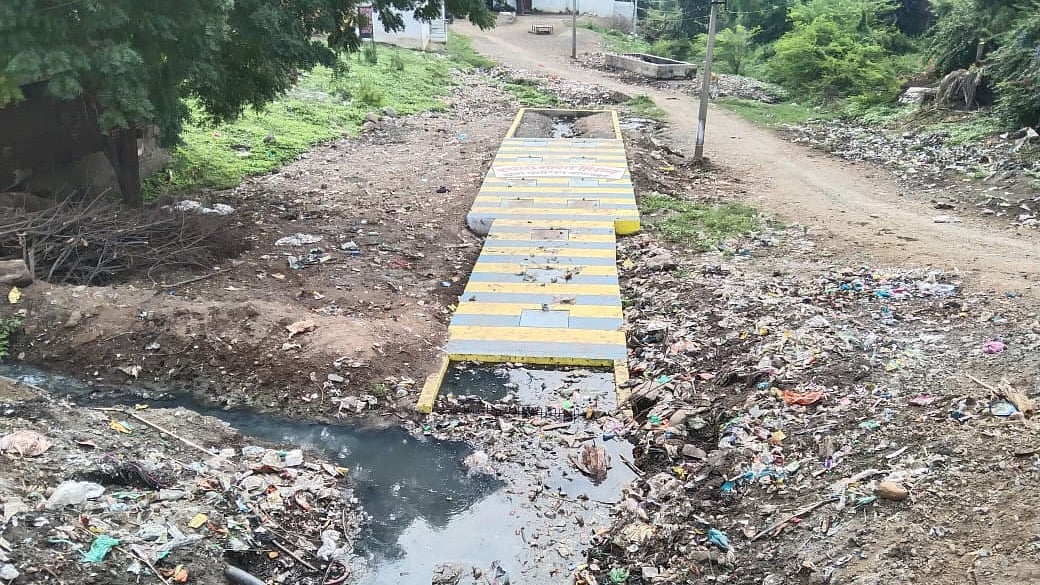MP: With DEWATS, Khargone takes lead in green solutions for wastewater treatment
Though the water purified through this technique may not be used for any other purpose than toilet flushing and gardening, the odour and dirt of water can be cleaned.

Balsamud (Khargone, Madhya Pradesh): In recent years, several villages in the country have embarked upon a journey of sustainable transformation that causes as little impact on the environment as possible.
One such village Balsamud in Khargone district, a sleepy little village close to the holy Narmada river is setting an example by treating its wastewater through the DEWATS (or Decentralised Waste Water Treatment System) technique, in an eco-friendly way.
In Khargone district, the mastery of cleaning wastewater has already been achieved through Waste Stabilisation Ponds (WSP) in the past. At present, 143 WSPs have been made in villages along the banks of the Narmada river in the district.
Meanwhile, a uniquely successful experiment has been done to clean the water by making an artificial slurry.
A unique water structure has been established in Balsamud under Swachh Bharat Mission. It treats the sludge and transforms the dirty and smelly water into clean water using the DEWATS technique. Though the water purified through this technique may not be used for any other purpose than toilet flushing and gardening, the odour and dirt of water can be cleaned.
District panchayat CEO Divyank Singh said that this is the first experiment in the state to clean the water of a dirty drain and release it into a river.
There are many such large panchayats in Khargone district where dirty drains are released into the river. DEWATS can prove to be effective in making them clean and dirt free.
These DEWATS are built under the Bhusawal-Chittorgarh highway pool in Balsamud village. Under this pool, dirty water from the big shops and establishments of the village gets collected.
How DEWATS works?
DEWATS is a technical approach to decentralized wastewater treatment in developing communities. The passive design uses physical and biological treatment mechanisms such as sedimentation, floatation, aerobic and anaerobic treatment to treat both domestic and industrial wastewater sources.
Here in Balsamud, there are about 90 houses in the settlement with a population of more than 5,000. DEWATS structure of 10 meters in length has been made here.
Janpad CEO Meena Jha informed that according to the design of this DEWAT, it can clean 24,000 litres of water per day. Each DEWATS costs around Rs 5 lakh.
There are six chambers inside it, through which the dirty water passes. Each chamber is 1.5 metres in length, 2 metres in width and 2 meters in depth. In which beds of boulders, sand, and ballast have been made. After passing through these beds, clean water exits through three pipes.
Why DEWATS?
In regions with a lack of sanitation, DEWATS provides the possibility of a nature-based, low-cost and sustainable wastewater treatment without a sewage network.
DEWATS is designed to be affordable, low maintenance, use local materials, and meet environmental laws and regulations. DEWATS has service packages available for the sanitation needs of small and medium-sized enterprises including communities, schools, municipalities, agro-industry, emergency settlements, hospitals, hotels, and prisons.
Two successful structures in Khargone to clean water
WSPs have been formed to clean the running water in the district. Which is built on the banks of Narmada river at 143 places. Due to this, it was considered an important structure in the direction of stopping the release of dirty water in the Narmada river. In this, the BOD and COD present in the dirty water were fixed and deposited in a pool. Now, in the same way, water is being successfully cleaned through DEWATS.
ALSO READ
RECENT STORIES
-
-
-
-
-
